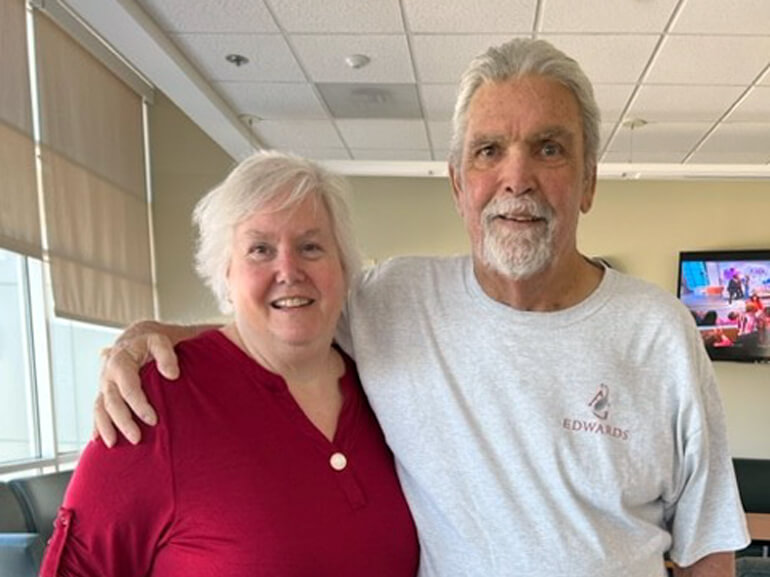Tim's story

Married father of four and a grandfather of seven, Timothy “Tim” Murphy, 74, is a devoted family man and retired manager of labor relations. A native of North St. Louis County, Tim lived a life rich with memories of coaching soccer and baseball, attending sporting events and enjoying family vacations.
One afternoon, Tim – who lived with several chronic health conditions – became ill and could not get out of bed. His wife called his doctor, and she was told to get Tim to the hospital by ambulance as quickly as possible.
At SSM Health St. Joseph Hospital, Tim was immediately taken to the intensive care unit (ICU) where he would spend the next four weeks in a sedated state. He was diagnosed with myocarditis, or inflammation of the heart muscle, which reduces the heart's ability to pump blood. Tim was also suffering from acute respiratory failure, which occurs when the lungs cannot release enough oxygen into the blood, as well as atrial fibrillation, also known as AFib, an irregular and often very rapid heart rhythm. While Tim was sedated, he underwent procedures to place a feeding tube and a pacemaker/defibrillator, a small device implanted in the chest that send electrical signals to start or regulate a slow heartbeat and can provide a shock that resets an abnormal heartbeat back to normal.
Tim’s six-week stay in the hospital left him severely weakened. Unable to walk more than a few feet without assistance due to poor balance and limited endurance, he was also unable to complete his personal care tasks without assistance. Additionally, Tim was struggling with his memory and other cognitive tasks due to several instances where his brain was deprived of oxygen. When doctors recommended inpatient rehabilitation as the next step in his recovery, Tim’s wife chose SSM Health Rehabilitation Hospital – Bridgeton. Having worked in human resources for Select Medical, a partner in the hospital, for over ten years, she was confident Tim would be in good hands.
Upon arrival, Tim’s goals were to “be a regular human being again. I wanted to walk and talk like I used to.” His interdisciplinary team of physicians and nurses as well as physical, occupational and speech therapists focused their care plan on Tim's goal of returning to his normal life.
When Tim was evaluated by physical therapists, he was only able to walk 10 feet with moderate assistance. While walking, he needed to be closely followed by a therapist with a chair because he was so weak. He was also only able to go up and down four stairs with support from his therapists. One of Tim’s therapy goals, besides walking, was to be able to get upstairs to his primary bathroom and bedroom. To accomplish these goals, physical therapists focused his sessions on increasing his strength and endurance by incorporating leg exercises plus walking longer distances and stair training. According to his therapists, Tim would often need to be reminded to take rest breaks because he was so motivated to improve and reach his goals.
In occupational therapy, Tim and his care team focused on increasing his endurance, his ability to balance while standing and improving his fine motor skills. One approach therapists used to help Tim to address these challenges was to stand while working on puzzles. They also concentrated on improving Tim’s ability to complete his activities of daily living, such as bathing, dressing and managing his medication, so that he could be as independent as possible upon returning home. “Working with Tim was a very enjoyable experience,” his therapist said. “I really enjoyed getting to see his progress every day and hear about his wonderful family.”
To address Tim’s difficulty with memory and other complex cognitive tasks, speech therapists worked with him on completing tasks to target short-term memory and working memory. They also introduced complicated tasks to target reasoning, financial management and medication management. To produce the necessary results, therapists had Tim use simulation materials such as a medication sorting kit and an iPad for playing memory games.
During his two-week stay at SSM Health Rehabilitation Hospital – Bridgeton, Tim made remarkable progress. By discharge, he was able to walk short distances using a walker and could go up and down a flight of stairs with just a bit of help for balance. He had also become independent with his personal care and was completing difficult financial tasks without assistance. “Everyone was impressed watching Tim progress throughout his stay,” his therapists said.
Tim says that the support of his family, particularly his wife, played a crucial role in his recovery. “This is the second time my wife saved my life,” Tim said, explaining that she called an ambulance to rush him to the hospital in 2016 when he suffered a stroke. He eagerly anticipated returning to his normal life, enjoying family gatherings, watching sports on TV and savoring his favorite meals. He planned to continue his recovery with visits to the SSM Health Day Institute three times a week.
Reflecting on his rehabilitation experience, Tim expressed profound gratitude for the excellent care he received. “Everything has been excellent. I feel so much more improved since getting here.” For those who are facing a difficult recovery, Tim offers the following: “If they have an opportunity to come here, then they should. I have had nothing but good care. All of the nurses and therapists have been great.”